Sex, God and Tragedy at Houston Grand Opera — Breaking the Waves Brings the Spiritual and Sensual Worlds Together
The Review Is In
BY Adrienne Jones // 04.26.25Lauren Snouffer in Houston Grand Opera's "Breaking the Waves" (Photo by Lynn Lane)
It’s not often you have the chance to see a groundbreaking work by a living composer and librettist presented on one of the world’s great opera stages. When Houston Grand Opera first revealed its production of Breaking the Waves, HGO CEO and general director Khori Dastoor described it as a “work of genius that can come once in 100 years.”
As the curtain came down on opening night, and composer Missy Mazzoli and librettist Royce Vavrek appeared on stage to take their bows with the magnificent cast, it was clear the performance was a triumph. The audience was on its feet roaring with appreciation. The emotional and dramatic experience hit its mark with an impact equal to that of the great tragic operas in the classical repertoire.
“This is a massive, spectacular production under the direction of Tim Morris, with an incredible set and some of the most incredible singers in the world,” Mazzoli says.
Houston Grand Opera legendary artistic director Patrick Summers is on the podium for all of the performances of Breaking the Waves during its run through May 4. This is Summer’s last production before he steps down after 25 years to assume his new role as music director emeritus. He calls Breaking the Waves “an important piece of art — a collision of spiritual worlds with sexual and sensual worlds.”
Being there to hear his masterful hand as he leads the HGO Orchestra in partnering with Mazzoli’s multi-textured score is worth the ticket in itself.
“The music is the engine of the opera,” Summers says. “The score is what creates the experience.”
Mazzoli says she’s always trying to balance something predictable with something unexpected.
“I think the music has to have a feeling of inevitability but also surprise, so it ends up somewhere you never expected, but it doesn’t feel jarring or out of place,” she notes.
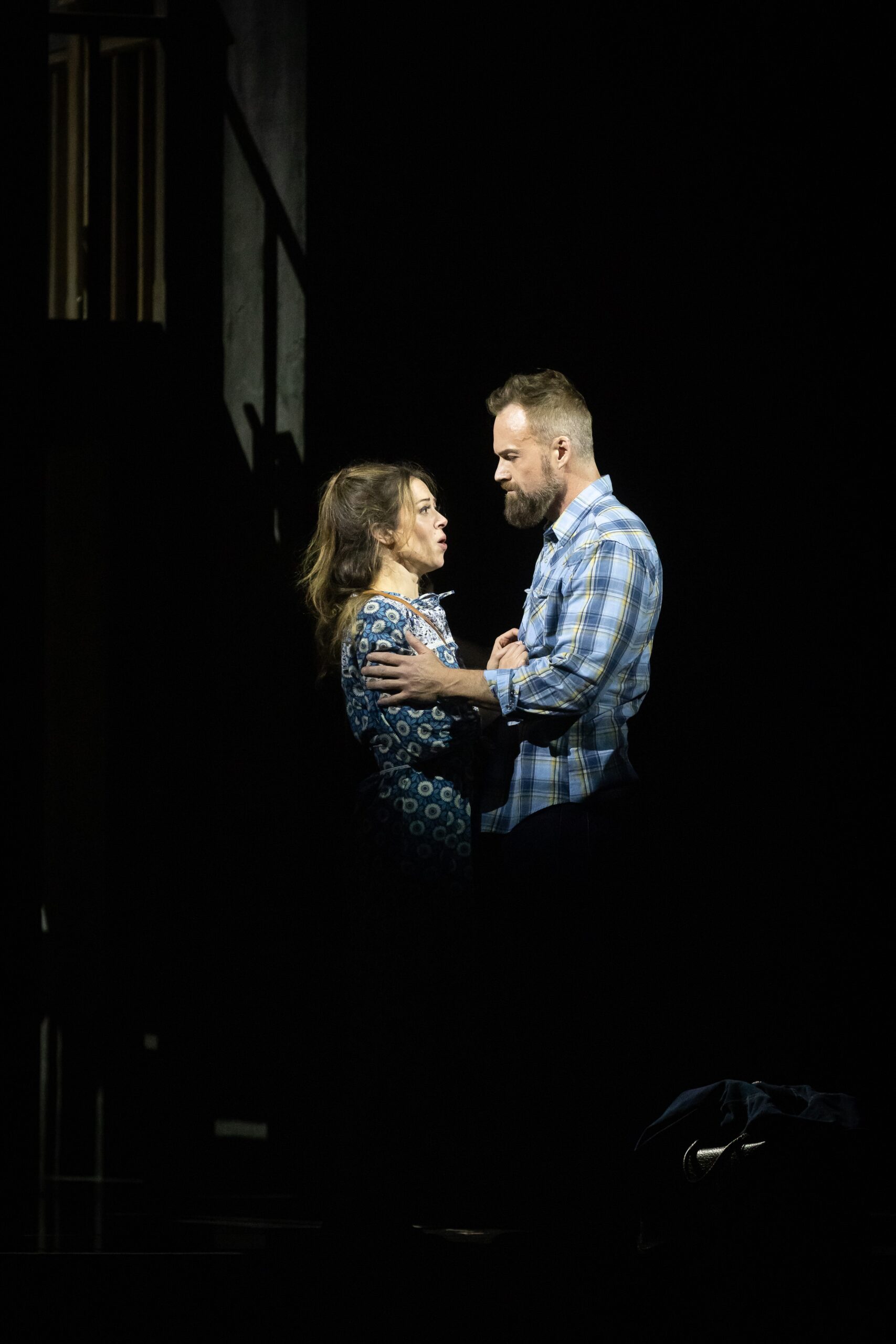
The much-sought-after soprano Lauren Snouffer stars as Bess McNeill, Mazzoli’s tragic heroine. Her voice is beautiful – clear, pure and angelic with an unadorned quality and formidable range. Her acting is brilliant, and she is very graceful and pretty too, like a spring daffodil on a slender stalk.
Bass-baritone Ryan McKinny is Bess’s husband Jan Nyman. Although his singing role is not as large as one might guess from his importance in the storyline, his voice is full and commanding.
Not to be overlooked is soprano Michelle Bradley’s strong, rich voice and impressive stage presence as Bess’s mother.
The opera generally follows the plot of Lars von Trier’s award-winning 1996 arthouse movie of the same name, from which it is adapted. However, Mazzoli’s emphases are different, as are the questions she wants the audience to consider about the role and responsibilities of women.
“My dream is for people to come out of the theater asking questions of each other,” Mazzoli says.
Diving Into Breaking the Waves
The story is set in the mid-1970s in a small village on the Isle of Skye off the west coast of Scotland. After oil was discovered in the North Sea in 1966, the waters around the Isle of Skye became a locus of offshore oil exploration.
Young, sweet, virginal and Scottish Bess McNeill asks the elders of her fiercely fundamentalist, Calvinist church for permission to marry Jan Nyman, a Norwegian oil-rigger, an outsider to their community.
During the wedding reception, Bess leads Jan into a bathroom where she enthusiastically initiates their first love-making. Thus ensues her acute sexual awakening and scenes of simulated sex — some implied, some more graphic, and some with partial nudity — which continue throughout the work until nearly the end of the opera, when she and Jan are parted by death.
After the gorgeous signature aria “His Name is Jan,” and a blissful wedding night, Bess traces the contours of his body and sings the words of the inviolate compact she has forged with him in her mind: “Our body is a map of our life together, having loved one another entirely and for good.”
However, after Jan leaves to return to his job on the rig, the story darkens. He becomes paralyzed in a horrific accident and is unable to be a husband to Bess. Whether to set her free or to satisfy his own sexual desires and fantasies, Jan instructs Bess to have sex with other men and return to tell him about it.
In that moment, Bess rebels. “You cripple,” she hurls at him. The audience gasps audibly, and she runs from the hospital room.
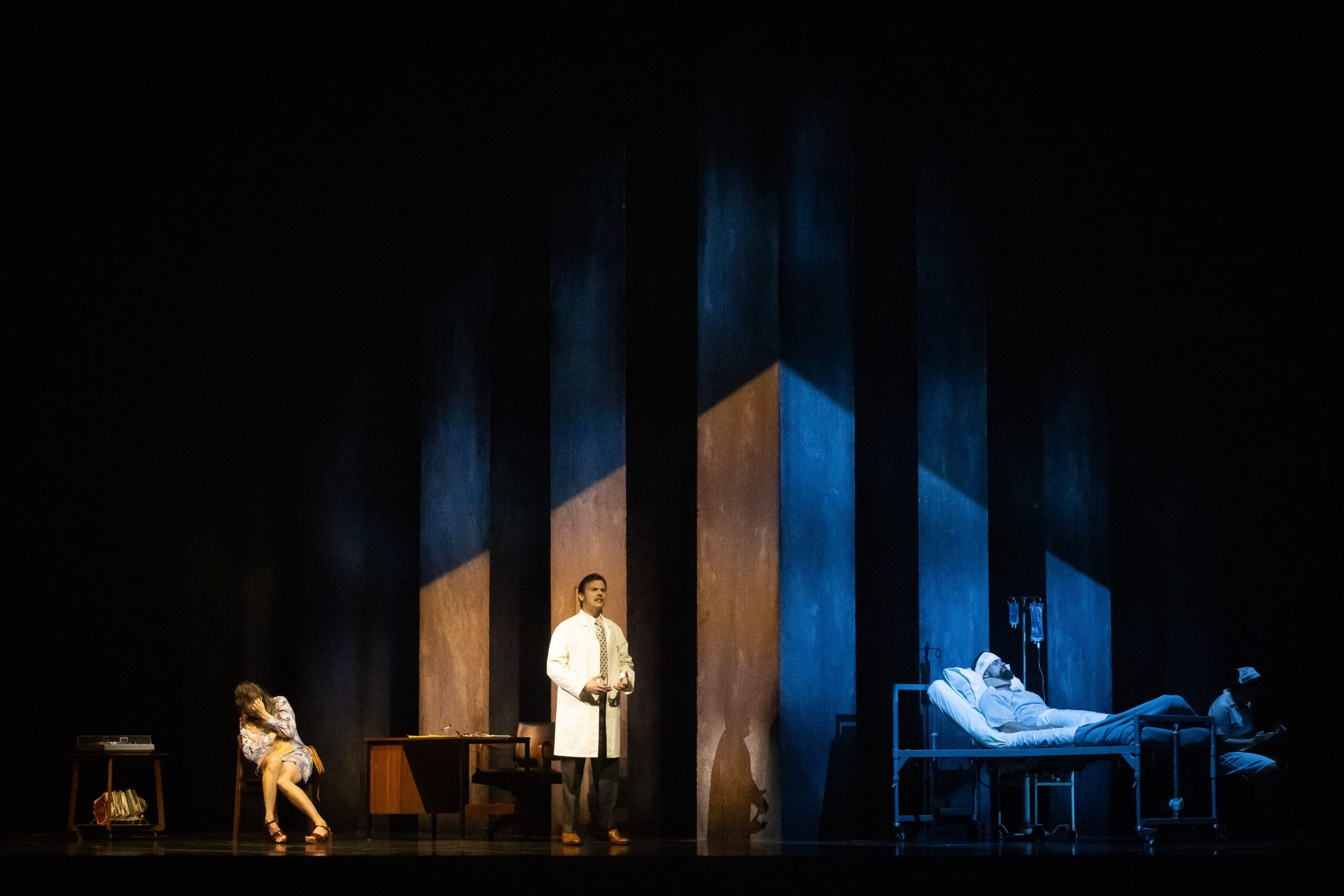
At that same moment, Mazzoli takes off on her own. She is unmoored from von Trier, from the film, from everything other than her musical imagination, which is unlike anything you will have heard before. It speaks, it sings. It pleads to make love. It is beautiful and lyrical, raw and threatening – but always more than soundscape, so often heard in contemporary opera.
The stage is filled with captivating music as suddenly everyone in Bess’s life is telling her what to do. Her mother tells her to “control her mood” and that “every woman endures.” Her sister-in-law gives her the tenderness her own mother lacks, but reminds her she “can’t just run off and leave him.” The harsh phalanx of church elders reminds her of Ephesians 5:22: A wife is to submit to her husband.
Dramatic scenes take Bess through the futility of trying to live for the affirmation and acceptance of other people.
“Everyone is telling Bess different things, and it’s literally impossible to follow everyone’s advice because these things contradict each other,” Mazzoli says. “So, yes, this is a very dramatized, extreme version of that playing out on the stage, fully fiction, but it has resonance with me because it mirrors that very difficult aspect of being a woman.
“I think women are held to the standard where the acceptable paths of behavior are so razor thin as to be unattainable. On the one hand, you’re supposed to please your husband, be pleasing to men, but not in a way that is disagreeable to anyone. And you’re not supposed to show your body. You’re constantly being labeled Madonna or whore.
“That is something that I feel intensely in my own life, and this idea that I kept coming back to when writing the opera – the idea of a woman in an impossible situation.”
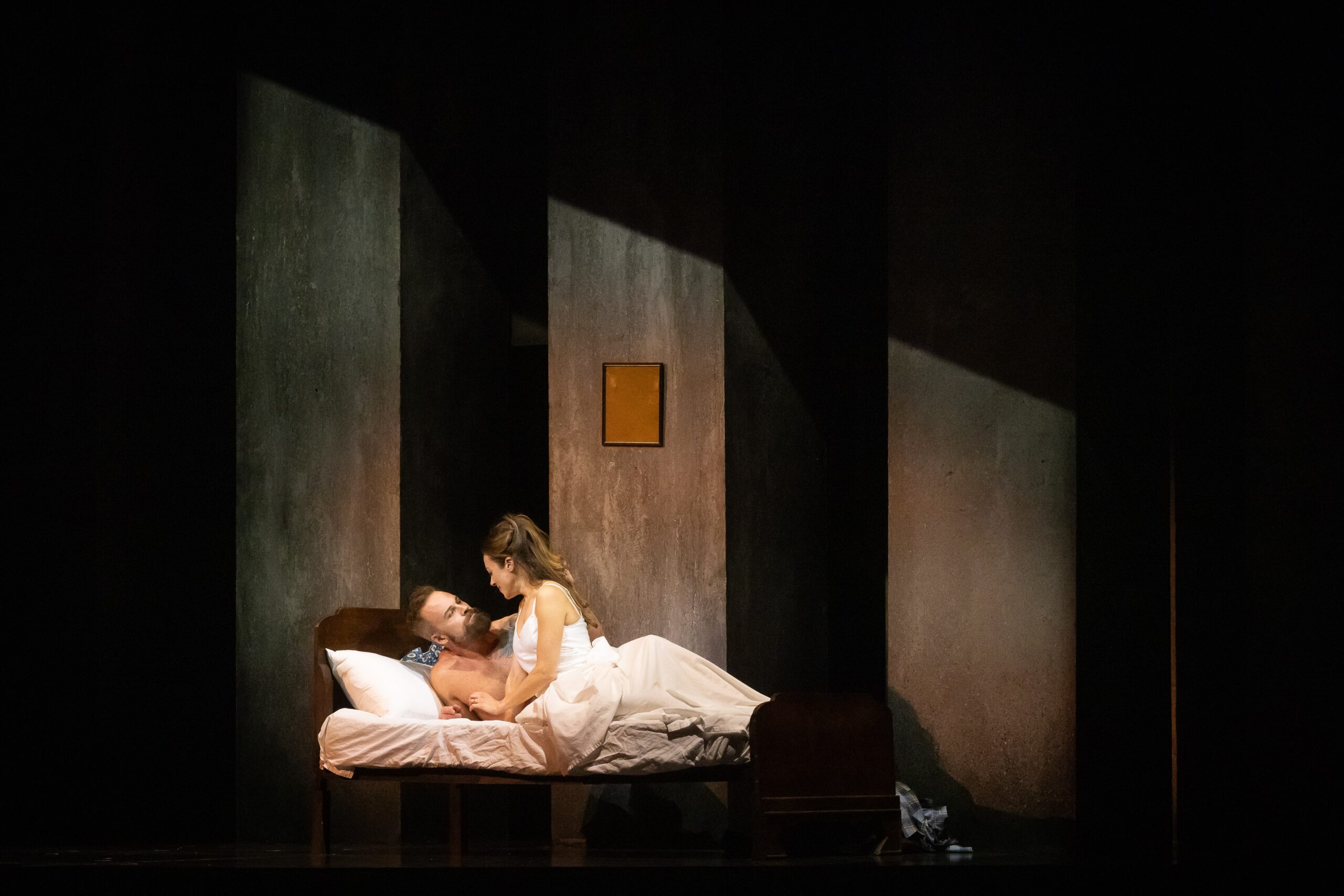
Willing Sacrifice Or Tragic Heroine?
And what of God? “God, are you still with me?” Bess asks. Are we surprised that the music Mazzoli has composed for God’s voice is spooky? Would he really tell her “You are a stupid, stupid girl?”
Is it coincidental that God has the same accent as she? Is he a projection of her imagination? Is she talking to herself? Or does she really believe she is hearing from the Almighty?
“That might be the central question,” Mazzoli says. “There’s this extraordinary, miraculous event that happens toward the end of the film and the opera, and it’s uncomfortable because we don’t know what caused it. I think one possibility is that, yes, Bess did have a direct line to God the whole time and was having these conversations with God.
“And then there’s a question of, Does it matter if God is real or not in this telling? I just have to leave it at that because it is the central mystery of the story.”
Although Mazzoli lets hang the question of whether Bess’ behavior helped Jan get better, she assures us that at least “Bess’s belief is that by being with other men she will heal him.”
“I make love with men to stop Jan from dying,” Bess sings. “My talent is I can believe.”
But Mazzoli says it’s not so simple.
“The realization you come to as listeners is that maybe that would have happened anyway, and maybe there is no God in this world.,” she says. “Maybe this is all for nothing. It’s this uncomfortable questioning at the end that I think gives the work its power. The story is: Was that worth it all?”
In a horrific climactic scene, Bess appears fairly hanging with her hands chained above her head. Her white dress is stained with blood. She is dead at the hands of sadistic tormentors. She has given her body — offered it up — once and for all.
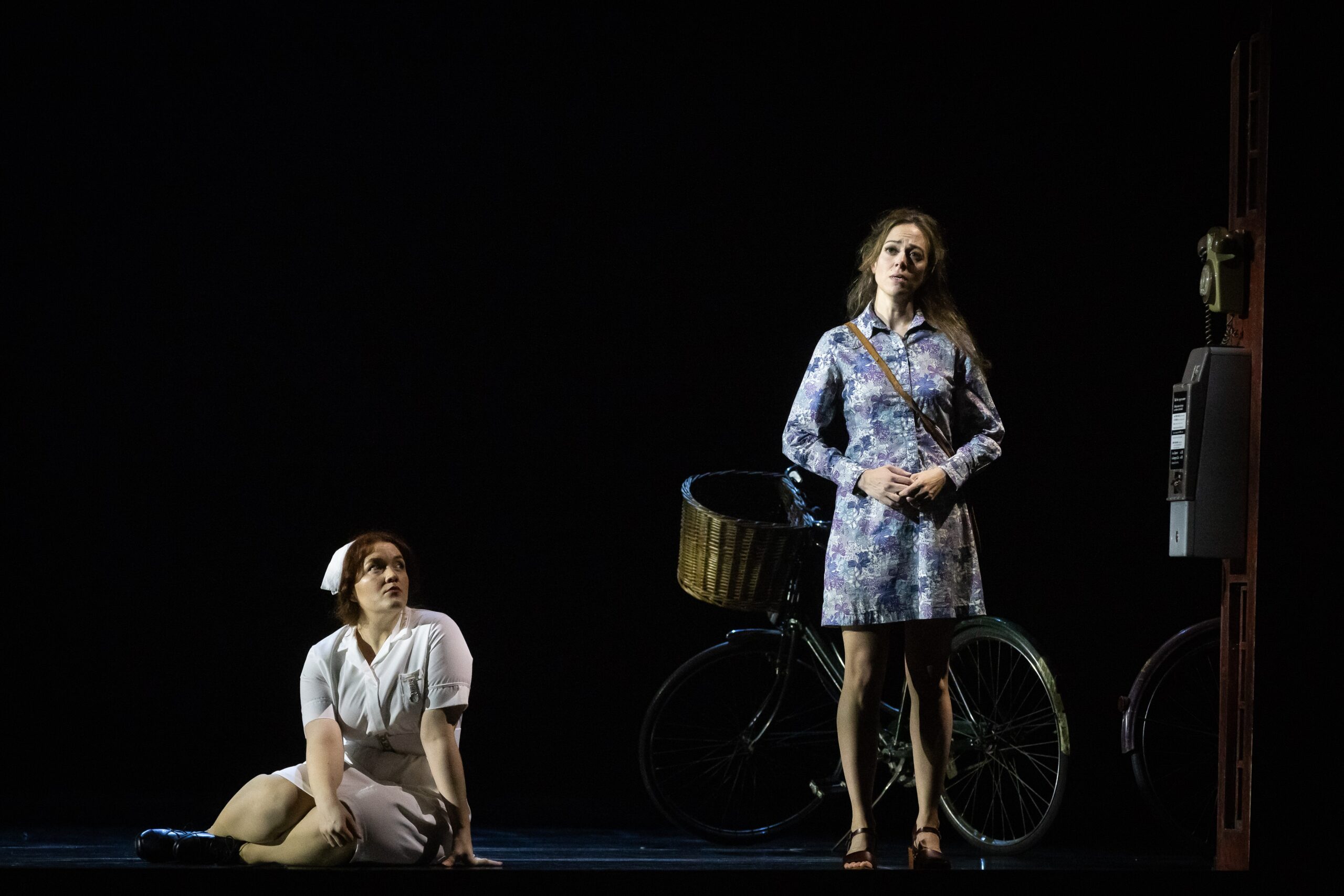
That visual comparison in this production to the scene in the Christian Bible at Golgotha, in which Christ sacrifices himself as an expression of love, is too clear not to mention. Similarly, one cannot ignore a comparison of Bess’ lifeless body, stretched across the arms of the sister-in-law who mourns her, to the pose of Jesus in his mother’s arms in Michelangelo’s Pietà. The entire cast massed on stage becomes a chorus of music and voices so powerful and transcendent it makes one wish Mazzoli will compose a Requiem in the future.
Aristotle tells us that, in drama, the climax is the turning point where the main character either succeeds or fails. Did Bess succeed or did she fail? Despite all the talk of God, is she more clearly “a tragic figure,” as defined by Aristotle, who was writing before the Christian era? She nearly meets the classical criterion, lacking only literal “nobility of birth.”
She is, as Aristotle describes the tragic hero in the Poetics, “neither virtuous nor a villain, but a character between two extremes.” Her misfortune is not brought about by “vice or depravity, but by some error or frailty [hamartia],” sometimes described as a fatal flaw. Was Bess’s fatal flaw that the nobility of her love fell from a high place to a low one — from the high place of pure love into the pit of obsession — thereby destroying herself (not to mention causing pain to others around her)?
On the other hand, Mazzoli would caution us not to be too quick in our conclusions.
“I don’t think Bess sees it as a sacrifice,” she notes. “She believes that her actions will cure him, and then we see the subtle ways in which she’s encouraged to do this. Everyone, including Bess, is acting in the way that they feel is the most good. . . and yet all these terrible things unfold.
“And who is at fault? Is it Bess purely sacrificing herself? Is it the oppressive patriarch of the Church of the 1970s Calvinist Isle of Skye? Is it her husband who has this misguided idea about how to set her free? Is it the doctor who doesn’t really listen to her? To call it a sacrifice is not wrong. But I think it’s only one part of it.
“In art we’re uncomfortable with female sacrifice, especially when it doesn’t seem to pan out or ends up with tragic results. I’m not saying we’re in the exact same position as we were in the ’70s or in the 1700s, but I think it’s something that still happens. Until it stops happening, that’s what I’m going to make work about: women in impossible situations, women making sacrifices.”

Glimpsing Eternity
Bess dies and Jan immediately recovers. Feminists in the audience might find it annoying, or at least surprising, that Mazzoli and Vavrek give Jan the last word in the opera.
Before Jan commits Bess’ body wrapped in a white shroud to the waves of the sea, he holds her to him and sings. In the audience, you can hear a pin drop:
“I stole you back. I stole you back. Your body is a map. I begin and end here. Wait for me in the whirlpool.”
Houston Grand Opera’s “Breaking the Waves “by Missy Mazzoli and Royce Vavrek runs at The Wortham Center in Houston on Saturday, April 26; Wednesday, April 30; and Friday, May 2 at 7:30 pm. There will also be a matinee on Sunday, May 4 at 2 pm. For more information and tickets, go here.








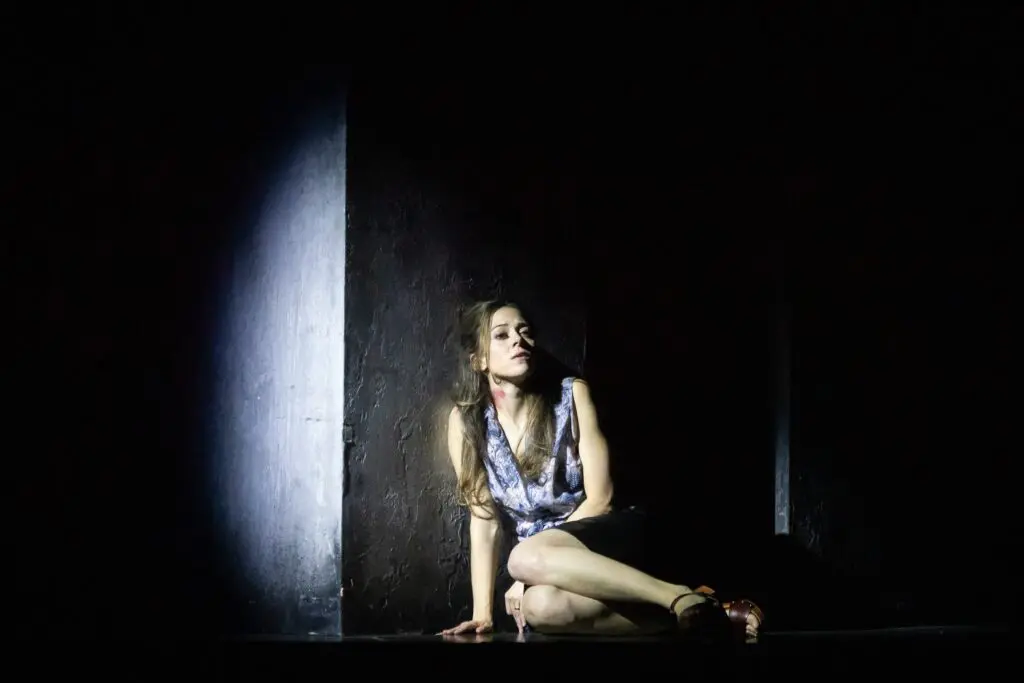























_md.jpeg)





_md.jpeg)

_md.jpeg)



_md.jpeg)

